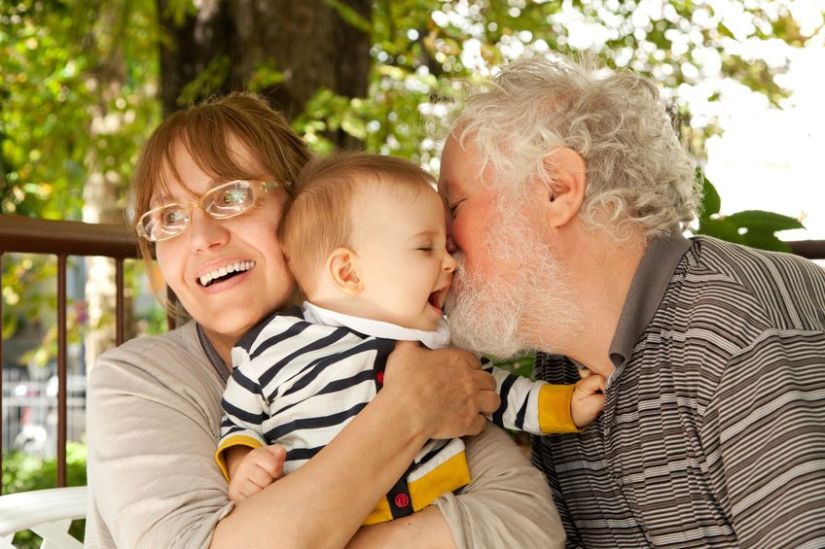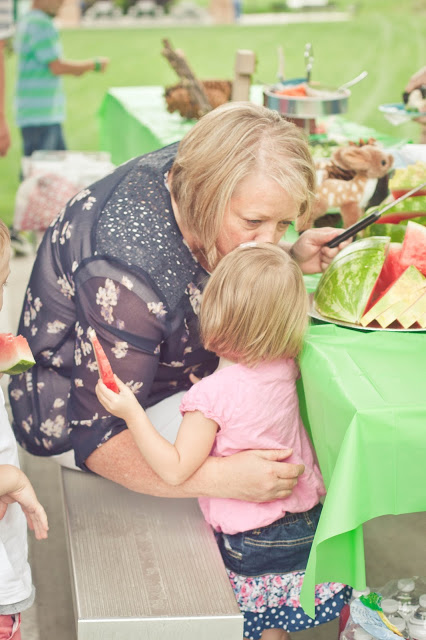 I still had my eyes closed in a state of sleep one morning last month, when I felt a shift in the force field centimeters from my nose. My eyes flipped open to an image of my new granddaughter, beaming, in a sunny yellow dress. As I blinked, trying to make sense out of my surroundings, I slowly realized that my husband had pulled her photo up on his phone and stuck it in front of my face to wake me up. I wasn’t quite conscious when I heard him say, “Look, Grandma! We have a precious new granddaughter, and we get to see her in a few weeks. She wanted to wish you good morning!” Her parents were bringing her to visit and we were both beyond ecstatic.
I still had my eyes closed in a state of sleep one morning last month, when I felt a shift in the force field centimeters from my nose. My eyes flipped open to an image of my new granddaughter, beaming, in a sunny yellow dress. As I blinked, trying to make sense out of my surroundings, I slowly realized that my husband had pulled her photo up on his phone and stuck it in front of my face to wake me up. I wasn’t quite conscious when I heard him say, “Look, Grandma! We have a precious new granddaughter, and we get to see her in a few weeks. She wanted to wish you good morning!” Her parents were bringing her to visit and we were both beyond ecstatic.
I had been looking forward to watching my husband as a grandfather for months, and he did not disappoint. A few months before my grandchild was born, we had a Chilean family over at our house for dinner. Their 4 year-old son spoke no English. A few minutes after they arrived, my daughter elbowed me and said, “Mom, look…dad is going to be the cutest grandpa.” I saw him down on his hands and knees, helping the little boy with a toy car he brought over, speaking his language, “Listo? Tírelo….. Mira que rápido que va.“
I understood the general meaning of what he was saying as, “Ready…Look how fast it went,” or goes, or something like that. What was unmistakable, though, was the sheer joy exhibited on the little boy’s face as he laughed and clapped his hands. My husband’s expression was reflective, showing that he was having as much or more fun as his small Chilean playmate.
What makes grandparenting so awesome?
Given a general increase in health and longevity, the potential for grandparenting influences is greater than ever. Many people report the grandparenting role as one of the most rewarding. I agree with the oft-repeated definition of “The fun part of parenting without all the hard stuff.”
Grandparents are storytellers, mentors, nurturers, caretakers, family historians and sometimes surrogate parents (in which case they do take on a lot of the “hard stuff”). They commonly reinforce the transmission of family values. Sometimes they offer more stability than parents. The rewards are reciprocal. Many grandparents report a sense of fulfillment by influencing grandchildren.
Grandparenting can be rejuvenating. Some people report that involvement with their grandchildren keeps them young. I can verify that as soon as I held my new granddaughter, I experienced many of the same feelings I had when I held my oldest son as a baby. Suddenly, I saw the world a different way. I wanted to experience everything anew with my child. That’s exactly the feeling I had with my granddaughter. Rejuvenating is an accurate descriptor.
What is “gray divorce” and how does it affect grandparenting?
One rather unfortunate effect of longevity seems to be a phenomenon called “gray divorce,” referring to the increasing numbers of couples divorcing in midlife or later. People divorce after several decades of marriage for many of the same reasons couples divorce earlier. With couples living longer, some are deciding they don’t want to continue to endure a difficult marriage, particularly if all the children are grown, and they have primarily stayed together for the children.
Sadly, even though any negative effects of grandparent divorce can be mitigated, it’s still a stressor that reverberates through an intergenerational family system. Grandparents who divorce sometimes perceive the grandparenting role as less important…especially males. Depending on the post-divorce relationships, sometimes grandchildren suffer if, for example, one grandparent refuses to show up at a family event the ex-spouse is attending. Sometimes watching grandparents divorce can reduce grandchildren’s confidence in their own abilities to endure a long-term marriage.
I remember when a teenager came in for a session right after her parents announced they were getting a divorce. She burst into tears and the first thing she said was, “I’m never going to be able to take my children to their grandparents’ house together, because they will be in separate households. Forever.” I was quite surprised at how futuristically she was envisioning her losses, but I could easily see why she was upset over the anticipated rupture in household structure. She was right. It was going to shift, and she had to reorganize her hopes and dreams for the future.
Is there hope for distressed “gray” marriages?
I recognize that sometimes divorce is inevitable. Personally, I would rather divorce than stay in a terrible marriage. However, I occasionally see couples who have given up hope when there is still hope left to shift negative patterns and heal previous betrayals, depending on the marital history and current context.
Some of my most rewarding marriage cases are with couples who have been married more than 40 years and feeling entirely hopeless that there’s anything I can offer them for improvement. “Why would anything be different now after 44 years of marriage?” I’ve been cynically questioned.
More often than not, I can point to specific markers of disconnection from their reported history and explain at least theoretically why the marriage can still be healed. I’ve noticed that many betrayals and injuries in marriage don’t heal automatically, and couples get stuck, confused about how to move forward and rebuild. Many of these couples were surprised that through therapy, they actually did heal past injuries and negative patterns and develop new ways of connecting.
I’ve had several couples experience a state of grieving after improvement, feeling sorrow over having lost so many years of connection, but they also treasure the time they have left. It’s fun to see them excited about each other, and realizing they may have developed more closeness than some of their aging peers in mediocre marriages.
I have only been a Grandma for a few months, but entering grandparenthood with my husband has so far been one of the dearest, most connecting times in our marriage. We are both so jointly entranced by this little person that we can’t be anything but happy when we are taking turns holding and playing with her. We keep looking at each other and saying, “This is our granddaughter. Isn’t she perfect? We had a part in creating this.”
I can’t help but think, “This is why we worked so hard to stay married…because now we get to have this.” She represents our expanding legacy. A grandchild brings unparalleled purpose and meaning to life, and it’s even more fun that my cute grandpa-husband and I are doing it together.
References:
Amato, P. R., & Cheadle, J. (2005). The long reach of divorce: Divorce and child wellbeing across three generations. Journal of Marriage and Family, 67, 191-206.
Brown, S.L., & Lin, I.-F., (2012). The gray divorce revolution: rising divorce among middle-aged and older adults, 1990–2010. Journals of Gerontology Series B: Psychological Sciences and Social Sciences, 67(6), 731–741.
Canham, S. L., Mahmood, A., Stott, S., Sixsmith, J., & O’Rourke, N. (2014) ’Til Divorce Do Us Part: Marriage Dissolution in Later Life, Journal of Divorce & Remarriage, 55:8, 591-612.
Greenwood, J. L. (2012). Parent–child relationships in the context of a mid- to late life parental divorce. Journal of Divorce & Remarriage, 53, 1–17.
King, V. (2002). Parental divorce and interpersonal trust in adult offspring. Journal of Marriage and Family, 64, 924-938.
King, V. (2003). The legacy of a grandparent’s divorce: Consequences for ties between grandparents and grandchildren. Journal of Marriage and Family, 65, 170-183.
Photo credit: Copyright: <a href=’https://www.123rf.com/profile_AnaBGD’>AnaBGD / 123RF Stock Photo</a>


